#Duopoly
Text
Web apps could de-monopolize mobile devices
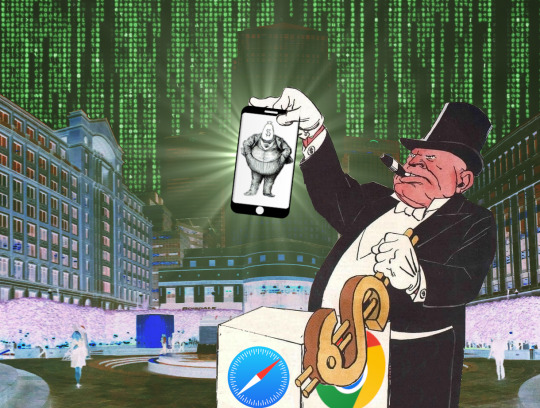
Mobile tech is a duopoly run by two companies — Google and Apple — with a combined market cap of $3.5 trillion. Each company uses a combination of tech, law, contract and market power to force sellers to do commerce via an app, and each one extracts a massive commission on all in-app sales — 15–30%!
This is bad for users and workers. Many companies’ gross margins are less than 30%. In some categories, that means there’s no competition. Take audiobooks: publishers wholesale their audiobooks to retailers at a 20% discount, so a retailer that sells its audiobooks through an app, paying a 30% commission, will lose money through every sale.
This is why the only convenient mobile audiobook stores are Apple Books (a front-end for Amazon’s Audible) and Google Books: Apple doesn’t have to pay the Apple tax, and Google doesn’t have to pay the Google tax, and that means that Apple and Google can demand crippling discounts and preferential treatment from publishers and independent authors.
The app tax is a tax on the workers whose creative works are sold on mobile platforms, because creative workers have the least bargaining power in this monopolized supply-chain. Our publishers can squeeze us — and the editorial workers, narrators, and sound technicians who work on our books — to make up the difference.
Independent authors who sell directly on these platforms, meanwhile, have even less leverage and get even worse terms. Things aren’t much better at the other end of the supply-chain, either: while firms prefer to wring concessions out of their workers and suppliers, they’re not averse to raising prices on customers, providing that all the competitors do so as well.
Since every competitor is also selling through an app store and either paying a direct app tax or ceding margin to the mobile duopoly as a condition of selling in their in-house, pre-installed stores, they all have the same incentive to raise prices.
Economists call this the monopsony problem (or, since we’re talking about two companies, a duopsony or oligopsony problem). That’s an unwieldy and esoteric term, so Rebecca Giblin and I coined a much better one, and wrote a book about it: Chokepoint Capitalism:
https://chokepointcapitalism.com/
Theoretically, there’s a way to avoid the app store chokepoint: web apps. These are part of the HTML5 standard, and if a browser fully implements that standard, then developers can make a self-encapsulated “app” that’s delivered in the browser, complete with an icon for your home screen, capable of doing anything an app store app can do.
A company that wants to sell stuff without paying the app tax could hypothetically deliver a web app that the user could download and install via their browser. This doesn’t just avoid the app tax, it also overrides the app stores’ editorial control, like Apple’s decision to block privacy tools in China to aid in state surveillance.
But you can’t have a web app without a web-app-compatible browser, and you can’t get a web-app-compatible browser in Apple’s App Store. The only browsers permitted in the App Store are those based on WebKit, the browser engine behind Safari. This means that every browser on Ios, from Firefox to Edge to Chrome, is just a reskinned version of Safari.
That’s a problem, because Webkit suuuuuuucks. Without the discipline imposed by either regulation or competition, Apple has systematically underinvested in Webkit, so that major bugs remain unaddressed for years and years. Some of these bugs are functional — Webkit just doesn’t act the way its documentation says it does — but others represent serious security vulnerabilities.
This is an important point: app store proponents say that denying users the right to choose where they get their apps and excluding competitors is necessary, the only practical way to prevent security risks to users. But while app stores can prevent the introduction of insecure or malicious code, they can also block the introduction of code that fixes defects in the manufacturer’s own security.
Mobile companies don’t want insecure code on their platforms, but they also don’t want to erode their profits. An Iphone with a working VPN app is more secure than one that lacks that app, but if that Iphone is owned by a Chinese person, it endangers Apple’s access to low-waged Chinese labor and 350 million affluent Chinese consumers.
Likewise, a third party might create a browser engine that corrects the security defects in Webkit, but if Apple allows users to install such a browser engine, they will lose the ability to extract billions through the app tax.
Companies never solely pursue their customers’ interests. Instead, they seek an equilibrium that allocates as much value as possible to their shareholders. This allocation is limited by both competition (the fear that a bad service will drive customers to a rival) and regulation (the fear that a bad service will attract crushing fines).
The less competition and regulation a company faces, the more value it can take from its users and give to its shareholders. Here, mobile platforms have it easy: they don’t have to worry about competition because of regulation. Laws like Section1201 of the Digital Millennium Copyright Act (DMCA) and Article 6 of the EU Copyright Directive (EUCD) make it illegal to jailbreak a phone to install third-party apps. Jay Freeman calls this “felony contempt of business model” — that is, the government will punish your competitors for trying to compete with you. Nice work if you can get it.
As the old joke goes, “if you wanted to get there, I wouldn’t start from here.” The rules that should promote better corporate conduct (through competition) instead encourage worse behavior, by putting companies in charge of who gets to compete with them, in the name of user safety.
Meanwhile, users are increasingly trapped inside walled gardens, because their media, apps, and data are locked up in mobile silos and switching to a rival means enduring the switching costs of leaving it all behind. Mobile companies claim to have built fortresses to keep bad guys out, but those high walls make fortresses into prisons that keep customers locked in.
But anything that can’t go on forever will eventually stop. The manifest unfairness and insecurity of the regulation-backed walled garden model has attracted the interest of new trustbusters, competition regulators from China to the EU to the USA to the UK.
The UK plays a key role here. The country’s Competitions and Markets Authority boasts the largest workforce of technical experts of any competition regulator in the world: the CMA’s Digital Markets Unit has 50+ full-time engineers, which allows it to produce the most detailed, most insightful market investigations of any nation’s competition regulators.
https://www.gov.uk/government/collections/digital-markets-unit
(Don’t get too excited, though: in keeping with the UK’s abysmal standard of government competence, Parliament has yet to pass the long-overdue secondary legislation that would give the DMU its own enforcement powers. Ugh.)
Last June, the CMA proposed a market investigation into cloud gaming and mobile browsers (gaming is the largest source of app store revenue and cloud gaming is a way to avoid the app tax, so it’s a closely related issue):
https://www.gov.uk/cma-cases/mobile-browsers-and-cloud-gaming
There were many significant submissions over this proposal, including comments that EFF legal intern Shashank Sirivolu and I drafted:
https://www.eff.org/document/comments-electronic-frontier-foundation-cmas-inquiry-mobile-browsers-and-cloud-gaming
Many commenters (including EFF) proposed that the CMA should intervene to improve the state browser engines competition on Ios and Android (Android allows multiple browser engines, but doesn’t give them the same hardware access that Chrome and its Blink engine enjoy).
This argument seems to have landed for the CMA. Today, they announced that they would go ahead with a full-fledged market study into mobile browsers and cloud gaming:
https://assets.publishing.service.gov.uk/media/63984ce2d3bf7f3f7e762453/Issues_statement_.pdf
The most obvious outcome of this study would be an order forcing the mobile vendors to open up to full-featured, alternative browser engines. This is compromise solution, between forcing open app stores onto the platforms — which would mean forcing Apple to allow sideloading and policing Google’s use of contracts to limit third-party stores — and doing nothing.
A browser engine mandate is less satisfying than open app stores, but it is also more achievable, and easier to monitor and enforce. With Android, Google proved that you don’t have to use hardware locks to prevent third-party app stores — you can use a hard-to-detect web of contracts and incentives to create an app store monopoly that’s nearly as airtight as Apple’s.
But policing whether a platform permits rival, full-featured browser engines — ones that enable web apps and cloud gaming without paying the app tax — is much easier. Also easier: developing objective standards for evaluating whether a browser engine is secure and robust. Open Web Advocacy’s criteria are a great starting point:
https://assets.publishing.service.gov.uk/government/uploads/system/uploads/attachment_data/file/1118238/Open_Web_Advocacy_-_Consultation_response_-_Publication_version.pdf#h.q9nder968wzm
The CMA announcement is welcome, but has some gaps. It under-emphasises the importance of hardware access (for web apps to compete with native apps, they need full hardware access), and could leave new browser engines at the mercy of the existing review teams that review all the other apps in the app store (who reject rival browser engines out of hand).
Meanwhile, while I was writing this article, Mark Gurman published a jaw-dropping scoop in Bloomberg: Apple will open its Ios platform to rival app stores by 2024, in order to comply with the EU’s Digital Markets Act (DMA):
https://www.bloomberg.com/news/articles/2022-12-13/will-apple-allow-users-to-install-third-party-app-stores-sideload-in-europe
I’m still absorbing this news, but I think this complements the CMA browser engine work, rather than rendering it redundant. Alternative app stores don’t necessarily mean alternative browser engines. Apple says it will have security standards for alternative app stores, and these standards could well include a ban on browser engines. At a minimum, it’s clear that different levels of scrutiny need to be applied to apps, app stores, and browser engines, as each one poses different threats and opportunities.
[Image ID: London's Canary Wharf, a high-rise business district that is home to the UK Competition and Markets Authority. The colours of the buildings have been inverted, and the sky has been filled with a Matrix 'waterfall' graphic. In the foreground is an ogrish giant, standing at a console, yanking on a lever in the shape of a golden dollar-sign. The console is emblazoned with the logos for Chrome and Safari. The ogre is disdainfully holding aloft a mobile phone. On the phone's screen is a Gilded Age editorial cartoon of a business-man with a dollar-sign for a head. The phone itself is limned with a greenish supernova of radiating light.]
#pluralistic#digital markets act#dma#ios#android#cloud gaming#gaming#mobile gaming#blink#chrome#interoperability#duopoly#comcom#safari#mobile#antitrust#apple#browser wars#competition and markets authority#browser engines#adversarial interoperability#trustbusting#open web advocacy#digital markets unit#google#competitive compatability#interop#competition#monopoly#uk
103 notes
·
View notes
Text
OK So Context
I kind of progressively lost my mind in college. What with the learning about the specifics of what is going on and how it relates to what has happened in the past. -and subsequently took the time to develop a series of presentations about why the US sucks.
Specifically, the interventions in Latin American, just the astoundingly predatory nature of American Capitalism domestically and The Police, like, as a concept.
Fast forward to the Summer of 2022 and I realized that working with an editor and publishing a book is hard and expensive but its measured in thousands not tens of thousands so I committed to doing that at some point in my life with this project, and began working on adapting the presentations with more research and more connections between these different expressions of White Supremacy.
I let the research balloon. There's just so much.
Anyway, the whole social media campaign thing was to distract me from pinning all that down. -and last month one of the members of my subreddit, u/acebush1, self immolated in the time it took to get around to responding to his most recent comment. That made this all very real. The US' support for Israel and it's foundation as a settler colonial state are critically relevant.
Right, so,. Last month someone asked me how to buy the book and that was the thing I had said to myself would mark the transition back to a writing and research focus rather than just research and learning social media.
Site is up. Its an email submission form with a set your own price stripe link.
#US Authoritarianism Project#Aaron Bushnell#US Politics#protest#writeblr#History#Colonialism#Imperialism#Police#Duopoly#Democracy#republicans#American Fascism#american exceptionalism#Slavery#Jim Crow#Segregation#Mass Incarceration#reservation#deportation#forced migration#sterilization#eugenics#ethnic cleansing#dred scott#japanese internment#guantanamo#trail of tears#US Authoritarianism#Anarchy
7 notes
·
View notes
Text
#coles#woolworths#iga#monopoly#duopoly#ausgov#politas#auspol#tasgov#taspol#australia#fuck neoliberals#neoliberal capitalism#anthony albanese#albanese government#supermarket#supermarkets#gst#tax#capitalism#poverty#eat the rich#eat the fucking rich#class war#anti capitalist#capitalist hell#capitalist dystopia#capitalist bullshit#cost of living#anti capitalism
7 notes
·
View notes
Text
Please for the love of God don’t let the lesson you learn from the Supreme Court abortion shit be “Vote Blue No Matter Who,” it’s this kind of thinking that got us here.
The Democrats are a part of the problem. They will constantly use the nominally more psychopathic Republicans as a reason to keep you corralled in bourgeoise elections that will never do anything for you. I promise donating your hard-earned money to a shiny new Democrat or voting really hard for Democrats is not going to stop or even slow this country’s descent into fascism, only socialism, real socialism can do that.
#politics#abortion#Abortion law#supreme court#woe v wade#dems#vote blue no matter who#duopoly#capitalism#socialism#communism#marxism leninism#vbnmw#elections#political discourse
46 notes
·
View notes
Text
A Frenzy of Innovation in Obesity Drugs is Under Way! Novo Nordisk and Eli Lilly are Printing Money Now. But They Will Not Be a Stagnant Duopoly
— March 7th 2024 | The Economist
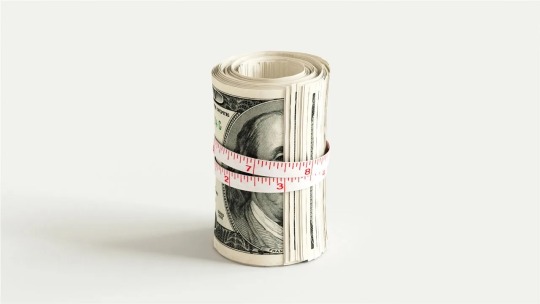
Image: Ricardo Tomás
Weight-loss jabs have turned out to be blockbusters. And for good reason. For one thing, after centuries of false promises and quackery, these drugs actually work. With nearly half the world’s population expected to be obese or overweight by 2030, demand for them is assured. And, more excitingly, they may be approved for a broader set of uses. Clinical trials suggest that they could reduce the risk of heart attacks, kidney disease and perhaps even Alzheimer’s. By the end of the decade annual sales of obesity medicines could hit $80bn, making them one of pharma’s biggest classes of drugs.
No wonder enthusiasm for the makers of these drugs, Novo Nordisk and Eli Lilly, is at fever pitch. Since the start of 2023 Novo, maker of Wegovy (and its sibling Ozempic), has seen its market capitalisation soar by 87% to $560bn, making it Europe’s most valuable company. Meanwhile the market value of Lilly, maker of Zepbound (and its sibling Mounjaro), has more than doubled to $740bn. One of these drugmakers could be the first to attain a market value of a trillion dollars, joining an elite club mostly made up of tech firms.
Add in the limited volumes and high prices for these drugs today, and you might think that this nascent industry is on course to be a price-gouging duopoly. In fact, the market will soon look drastically different from what you see now.
Right now the drugs are in short supply. Shortages of their active ingredients, like semaglutide for Wegovy, and of the skinny “pens” used to inject the medicine, are a constraint on production. And with a list price of almost $16,000 a year, these treatments are not cheap. Although a few users may be able to afford the cost themselves, most will need help from insurers or health services—many of which have yet to be convinced that the benefits are worth the drugs’ eye-watering prices.
Access will be an even bigger problem in much of the emerging world, which is projected to experience the largest increases in obesity as incomes rise and diets change. So far most of Lilly’s and Novo’s sales have been in America, with the rest going mainly to Europe. Nor does it help emerging-world patients that the jabs need to be refrigerated, making them unsuitable for use in countries with less developed supply chains.
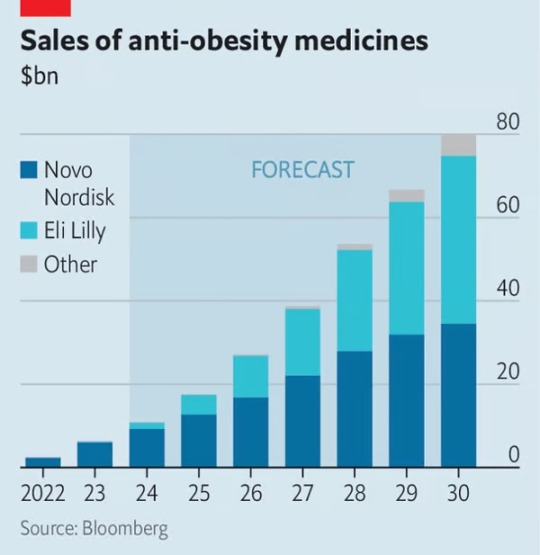
Image: The Economist
Yet there are good reasons to think that in future the market will see expanded supply, lower prices and a more global patient base. For a start, investment by Lilly and Novo to expand production should ease bottlenecks over time. Both firms are pouring billions of dollars into boosting supply by building their own capacity and teaming up with other manufacturers. Lilly and Novo are also racing to gain an edge over each other. Novo has already developed a pill that is about as effective as its injectable version. Lilly expects to launch its own obesity pill in a few years. Both companies also have newer versions of the drugs in the late stages of development which are more efficacious or have fewer side-effects.
More important in the long term, however, is the array of competitors preparing to enter the market. Wegovy, Zepbound and their ilk are less protected by patents than, say, Humira, a blockbuster anti-inflammatory drug that has reaped more than $200bn in sales over 20 years.
Already more than 70 companies are running close to 100 clinical trials for obesity drugs. These include big pharma firms (Amgen and Boehringer Ingelheim) and smaller biotechs (Viking Therapeutics and Structure Therapeutics) in the West, as well as Chinese drugmakers such as Sciwind Biosciences and Eccogene. Many are testing versions that are distinct enough from Wegovy and Zepbound that patent protections will not apply, allowing them to come to market within a few years, should they gain regulators’ blessing.
Some candidates in the pipeline could be more effective than existing treatments; others might do away with the inconvenience of today’s drugs, which require patients to inject themselves once a week and to continue taking them indefinitely to keep their weight down. Viking’s experimental drug, for example, has been shown to help patients shed more weight than existing jabs. Amgen is testing a treatment that does not require patients to be on the drugs indefinitely. And Structure is developing a promising-looking pill.
Healthy Competition
This frenzy of innovation is welcome. Lilly and Novo may lose their lead in the long term if cheaper alternatives arise; or they may themselves furiously innovate to reduce costs. Either way, prices should come down, making the drugs more accessible to patients around the world. Today the two pharma firms are reaping the rewards from their blockbuster drugs. But in time it will be consumers who benefit most of all. ■
— This Article Appeared in the Leaders Section of the Print Edition Under the Headline "The Real Skinny"
#Leaders | The Real Skinny#The Real Skinny#Frenzy#Innovation#Obesity Drugs#Novo Nordisk | Eli Lilly#Printing 💵 💴 💰#The Economist#Duopoly
0 notes
Text

"Dementia Joe's Puppet Show"
(duotone version 3/7/24)
Cover art by Danny Hellman for THE SHADOW
(edited & published by Chris Flash)
#illustration#illustrator#comics#politics#duopoly#election#democracy#propaganda#corruption#biden#trump
0 notes
Text

#duopoly#unipolitics#uniparty#voting is a scam#fuck capitalism#capitalism kills#we live in hell#socialism now#abolish capitalism#peoples union
0 notes
Text
#Duopoly on the ballot in #Murica…again
Awareness is the way out.
Even the most propagandized, corporate captured, patriotic, colonizer friendly American voter has to know something is up, something is amiss to have the same two candidates in back to back presidential elections, with one candidate being the front runner for a third consecutive election.
No one ever went broke under estimating the intelligence of the American…

View On WordPress
#2024#america#american democracy#biden#democracy#democrats#dnc#duopoly#Election#election season#murica#politics#republicans#rnc#Trump#voting
0 notes
Text


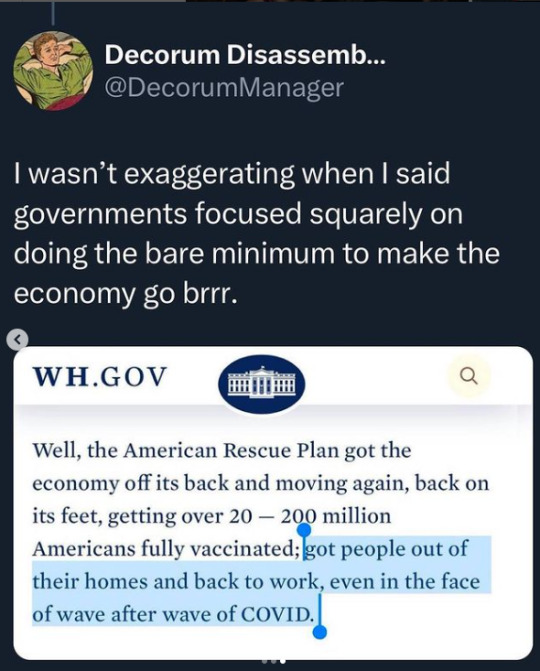
When those in power constantly lied about the little things, it isn't hard to see why people have tuned out--and even questioned whether masks were even effective against the virus.
#coronavirus#long covid#covid 19#pandemic#america is a failed state#dump the duopoly#america is a shithole country#fuck the system#fuck them all
10K notes
·
View notes
Text
The Growing Duopoly In Indian Aviation - IMPRI Impact And Policy Research Institute
Kaibalyapati Mishra and Krishna Raj
Recent developments in the Indian aviation sector are cause for concern, as the industry has virtually turned into a duopoly market. IndiGo and Air India have proven to be established players, while newer airlines have all but exited the aviation market owing to predatory pricing of flight tickets. The emerging duopoly market between IndiGo and Air India has…

View On WordPress
0 notes
Text
#authoritarianism#us politics#largest prison population#abolish prisons#duopoly#us prisons#usa#police#usempire#us empire#politics#mass incarceration#prisoner rental#convict leasing#slavery#modern slavery#prisoner#geriatric care#old people#retirement#the state of things#the current state of affairs#current state of affairs#us authoritarianism#prison abolition#US#ushegemony#America#the United States of America#United States of America
4 notes
·
View notes
Note
Republican Christofacists applaud your support.
I assume this is about my abortion post.
It is ridiculous to me to suggest me saying “don’t support neoliberal capitalists, support socialism, the only thing that stops fascism” is the same thing as saying “support fascism.” However, I understand the frame of thinking that leads to this. I am an American and I know full well how Americans (and many others who consume our media and culture) believe that Democrats and Republicans are worlds apart. Allow me to try and convince you otherwise, and explain how going the VBNMW route does nothing but ensure more fascist policy such as banning abortion:
Democrats and Republicans both serve the same capitalist masters. The entire point of the duopoly is to take revolutionary potential--both from the Left (socialism) and the Right (fascism)--and funnel it into elections controlled by the capitalist ruling class, from a crop of candidates who all fit neatly within the system as it exists. In this system, the average person has absolutely no effect on policy. The Democrats and the Republicans might have small differences in a few social domestic policies--a little pro/anti gay marriage here, a little pro/anti abortion there--but ultimately they will not do anything that interrupts the capitalist hegemony, their imperial machine, or their profits, and ultimately even these social domestic policies all slowly fall rightward towards fascism.
Proper capitalists are a little torn on their comfort level with fascism, but NONE of them want socialism. To them, fascism will ALWAYS be the prettier alternative to socialism. You can see this with how the judicial system, the alphabet agencies, and the war machine treats the Left vs the Right; people even remotely on the Left are teargassed, blackbagged, sabotaged, infiltrated, assassinated, etc., whereas as often as possible people on the Right are given a slap on the wrist for similar behavior (protests, violence, disobedience, belligerence, etc.).
Republicans, despite often being the minority in American politics, are the only ones ever permitted by their capitalist masters to enact their preferred policies. Fascism has slowly been creeping in America for the last hundred years, gaining and consolidating power, entrenching itself.
Democrats, on the other hand, hardly ever do ANYTHING they claim to be in favor of, even when they enjoy supermajorities in multiple branches of government. They deflect blame onto Republicans for obstructionism, and yet when the tables are turned the Republicans never seem to run into this same problem. This is no mere coincidence--the Democrats are snakes, they know full well what they are doing. It's not even a matter of them being spineless cowards, they are filling their assigned niche quite well.
So what is their niche? To be a blackhole that sucks and nullifies all leftward potential. The average person isn't an idiot, so they give us small concessions--politicians who were vehemently anti-gay just years ago come out as in favor of gay marriage and get it passed for a short time, state legislatures legalize marijuana, closet racists reluctantly swirl around a BLM flag. But they don't DO anything substantively that would threaten their capitalist masters. They only are pro-gay as long as the LGBTQ community is a profitable market to exploit. They are only pro-weed as long as they can still populate the prisons with non-violent offenders for slave labor. They are only pro-BLM as long as black people will remain a second-class citizen to be exploited and sucked dry for money--ask the Black Panthers, who wanted to actually change the system and help black people, who were all assassinated and jailed and tortured (some of whom are still alive and in jail!), ask them how pro-BLM the Democrats who joined the Republicans in destroying them are.
The Democrats are merely the cozy, friendly face of the duopoly. They support all the same wars, they support the same real-life oppression and abysmal living standards of the vulnerable, they support the same imperialization of vulnerable countries, the endless boosts to the budgets of the military for enemies of capitalism abroad and the police for enemies of capitalism at home. They give the good-hearted and well-meaning American liberal an outlet that doesn't challenge the status quo, nullifying any potential for change that they represent.
So, you might say, "Sure, the Democrats aren't perfect, but they're better than Republicans! What about the small victories, such as securing the right to have an abortion?"
But this is missing the point. The "battle" between Democrats and Republicans isn't a tug-of-war between opposing factions, they are willing puppets of the same masters. Democrats don't stop or even slow the rise of fascism (which only mildly inconveniences them), in fact they destroy the only thing that CAN stop fascism: socialism. Abortion would have been made illegal no matter how many Democrats you voted into office. Democrats hold your hand and promise they too are outraged by police brutality, until they get elected, and then they dump money onto militarizing the police. Democrats claim they are in favor of gay marriage when 51% of the populace says they are in order to get a vote, but when (not if, but when) Republicans come after gay marriage again they will do NOTHING to stop it, because using any of their arsenal of powers for social justice will get people thinking dangerous things: "Hey, if they used an executive action for X, why don't they use it for Y?" "Hey, if the Democrats managed to push through X bill, why can't they do Y bill next?"
Democrats keep your expectations low. They condition you to expect a grim, futile world where nothing changes but everything slowly gets worse. They train us to internalize things like, "Well, that's just politics for ya," or, "Well, the world's not supposed to be perfect." It is no coincidence that a 1/3-1/2 of Americans DON’T EVEN VOTE AT ALL! It’s not because they’re “lazy” or “stupid,” but because they see the truth: that it does NOTHING to help them at all, that NOTHING ever changes for the things that matter MOST, no matter who is in office.
The Democrats paint a world where the good is just not strong enough, outnumbered and outgunned by evil, for those not completely taken by apathy. If only you would donate a LITTLE more, if only you could get a LITTLE more of your friends to vote, maybe THEN things would change!
They knew full well the Supreme Court was quietly working on stripping away abortion rights, so what did they do?
Did they organize massive protests? Did they fight tooth and nail in the legislative bodies to save it? Did they codify it into law during the DOZENS of opportunities they had to do so for DECADES, when they enjoyed majority seats, presidents, Supreme Court justice majorities, etc.?
No, no, and NO.
Here's what they DID do: they drafted up stirring, passionate, well-worded emails and text messages to send to all of their mailing lists the moment the news dropped. They leaped on an opportunity to milk their fanbase. They know this would help convince suckers to dump their hard-earned cash bankrolling their elections, bankrolling their golfing vacations and champagne-clinking dinner parties. Something brimming with outrage, something for the suckers to FEEL like the Democrats represented them, that they were on their side, that they were the good guys that were taking a stand against the bad guys...
They don't represent you, they represent capitalist corporations. They're not on your side, they're on the side of making money and preserving the system as is. They aren't the "good guys" and they aren't "taking a stand" against the Republicans. They might not be quite as psychopathic as Republicans at a cursory glance, but look closer. They squash all leftward movement. They enable fascism. And they have done nothing but those two things for a century now.
` ` ` ` ` ` ` ` ` ` ` ` `
If anybody would like to cut down and condense these arguments into something more easily readable, by all means please steal and make your own, in part or in whole.
#ratchet effect#politics#political discourse#abortion#surpreme court#pro choice#abortion rights#abortion law#democrats#liberal#democrat#dnc#duopoly#corporate duopoly#corporatism#capitalism#socialism#communism#fascism#fuck republicans
6 notes
·
View notes
Text

Jane Rants Episode #6: Enough is Enough
#JanesWorld#JaneRants#6: Enough is Enough#EastPalestine#NorfolkSouthern#duopoly#EPA#SacrificeZone#CoverUp#cancer#WeThePeople#freedom#liberty#politics#comic#gif#art#toon
0 notes
Photo
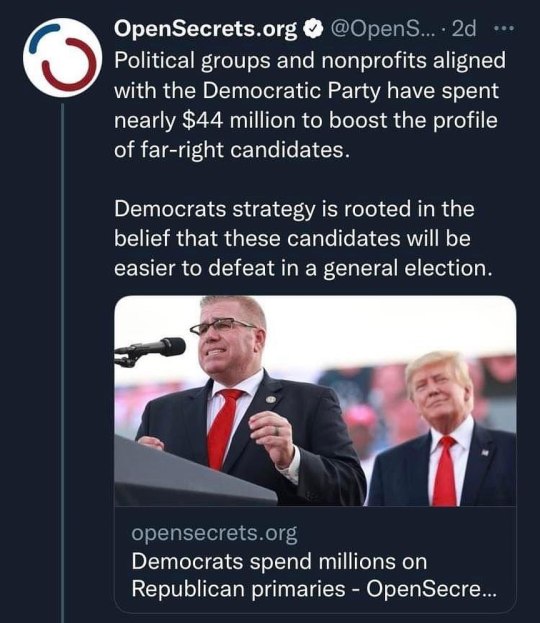
Here we Go Again!! #piedpiperstrategy #hrc #dnc #rnc #duopoly (at Dallas, Texas) https://www.instagram.com/p/Chsrv9mrv1N/?igshid=NGJjMDIxMWI=
0 notes
Text
Progressive Party Builders: Aug 7 Winning 101 Workshop
Are you thinking about running for local office? We need regular everyday workers in local government, helping communities, making a difference. You are INVITED. Aug 7 Sunday at 2pm
Are you thinking about running for local office? We need regular everyday workers in local government, helping communities, making a difference. You are INVITED. Aug 7 Sunday at 2pm
Join the Progressive Party Builders for a panel on Winning 101. Learn about running for office, candidate recruitment, what makes a viable candidate and MORE!
REGISTER TODAY:…

View On WordPress
0 notes
